
The Cyperaceae are a family of graminoid (grass-like), monocotyledonous flowering plants known as sedges. The family is large, with some 5,500 known species described in about 90 genera, the largest being the "true sedges" genus Carex with over 2,000 species.
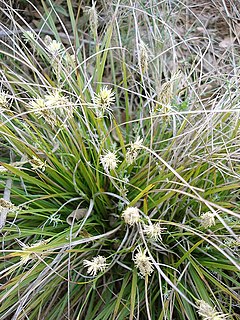
Carex is a vast genus of more than 2,000 species of grass-like plants in the family Cyperaceae, commonly known as sedges. Other members of the family Cyperaceae are also called sedges, however those of genus Carex may be called true sedges, and it is the most species-rich genus in the family. The study of Carex is known as caricology.
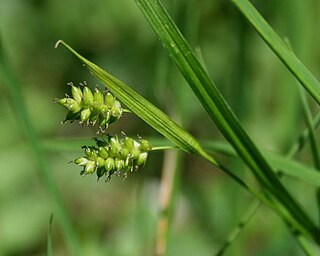
Carex pallescens, called pale sedge, is a widespread species of flowering plant in the genus Carex, native to the northeastern United States, eastern Canada, Iceland, Europe, Tunisia, and western Asia. It has unstable chromosome numbers.
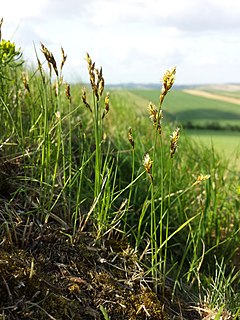
Carex praecox, the spring sedge, is a species of flowering plant in the genus Carex, native to Europe, western Asia, and Mongolia. Its chromosome number is 2n=58, with some uncertainty.
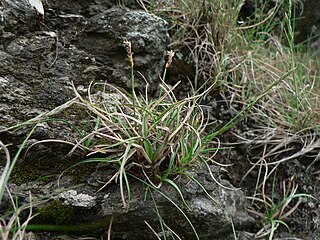
Carex rupestris, called the curly sedge and rock sedge, is a species of flowering plant in the genus Carex, native to temperate and subarctic North America, Greenland, Iceland, Europe, and Asia. It prefers to grow on rocky ledges.

Carex stipata, variously called the prickly sedge, awl-fruited sedge, awlfruit sedge, owlfruit sedge, swamp sedge, sawbeak sedge, stalk-grain sedge and common fox sedge, is a species of flowering plant in the genus Carex, native to Canada, the United States, China, Korea, Japan, and Far Eastern Russia. It is a wetland obligate.
Carex microglochin, called the fewseeded bog sedge and bristle sedge, is a species of flowering plant in the genus Carex, native to temperate and subarctic North America, South America, Europe and Asia. It is uncertain which hemisphere it originated on before dispersing to the other.
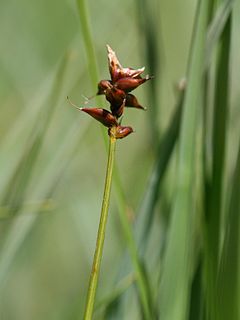
Carex dioica, the dioecious sedge, is a species of flowering plant in the genus Carex, native to Iceland, the Faroes, Svalbard, nearly all of Europe, western Siberia, and the Altai. It prefers to live in calcareous fens.

Carex divulsa, the grey sedge, is a species of flowering plant in the genus Carex, native to Macaronesia, Europe, northwest Africa, the Caucasus region, and the Middle East as far east as Turkmenistan. It has been introduced to northeast Argentina, the District of Columbia and Pennsylvania in the United States, Ontario in Canada, the North Island of New Zealand, and Tasmania and Victoria in Australia. It is the namesake of the Carex divulsa aggregate.

Carex hostiana, the tawny sedge, is a species of flowering plant in the genus Carex, native to Europe and northeast Canada, and extinct in Massachusetts. It is a member of the Carex flava species complex.
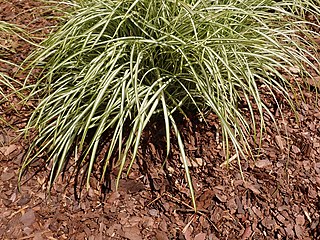
Carex ornithopoda, called the bird's foot sedge, is a species of flowering plant in the genus Carex, native to most of Europe, and Anatolia. A variegated cultivar is commercially available.
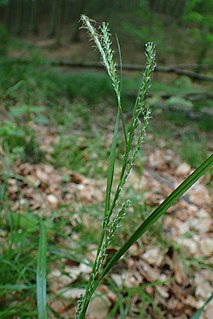
Carex strigosa, the thin-spiked wood sedge, is a species of flowering plant in the genus Carex, native to Europe and the Caucasus region. Its chromosome number is 2n=66.
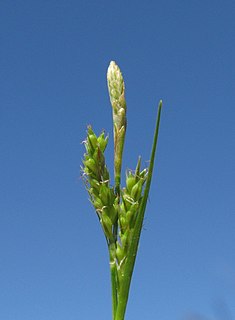
Carex breviculmis, called the Asian shortstem sedge, is a species of flowering plant in the genus Carex, native to Asia from the Indian subcontinent to Southeast Asia, China, Taiwan, Korea, Japan, north as far as Khabarovsk Krai, and Malesia, New Guinea, Australia, Norfolk Island and New Zealand. It has been introduced to the US state of Mississippi. Typically found in forests, it is quite shade tolerant.

Carex lachenalii, called the twotipped sedge and hare's foot sedge, is a species of flowering plant in the genus Carex, native to temperate and subarctic North America, Greenland, Iceland, Europe, and Asia, and the South Island of New Zealand. Its chromosome number is 2n=64, with some uncertainty.
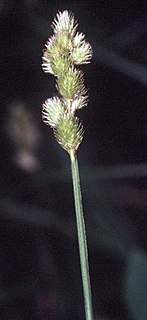
Carex tribuloides, the blunt broom sedge, is a species of flowering plant in the genus Carex, native to the eastern United States, eastern Canada, and Veracruz in Mexico, and introduced in Sweden. It is an important food for soras during their spring migration.

Carex maritima, called the curved sedge, is a species of flowering plant in the genus Carex, with a bipolar distribution in mountains and cold regions. It dispersed in the Pleistocene from the northern to the southern hemisphere.

Carex lepidocarpa, called the long-stalked yellow-sedge, is a species of flowering plant in the genus Carex, native to eastern Canada, Morocco, and most of Europe. It is a member of the Carex flava species complex.
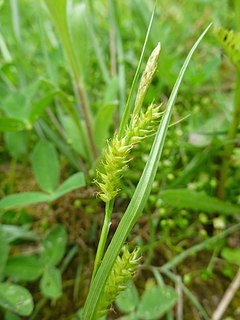
Carex punctata, the dotted sedge, is a species of flowering plant in the genus Carex, native to Macaronesia, northwest Africa, southern, central, and northern Europe, and Turkey. Its chromosome number is 2n=68.
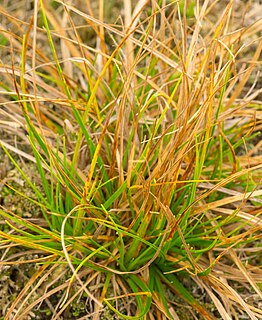
Carex umbellata, the parasol sedge, is a species of flowering plant in the genus Carex, native to Canada and the central and eastern US, and introduced to the Dominican Republic. Its seeds are dispersed by ants.
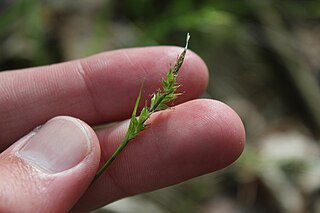
Carex communis, the fibrous-root sedge, is a species of flowering plant in the genus Carex, native to central and eastern Canada and the central and eastern United States. Its seeds are dispersed by ants.



















